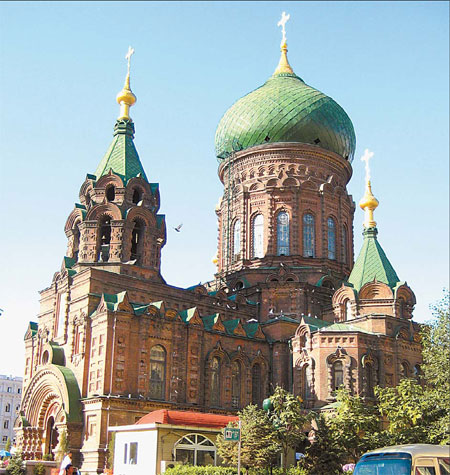Harbin restaurant manager Katerina Esmanovich looks up at the clock expectantly. A long table is set with a white tablecloth, pink flower bouquets, and yellow napkins folded into wine glasses like fans. The wedding party is on its way.
|

|
|
St. Sophia Cathedral, an icon of Harbin's Russian community, was built during the city's roaring 1920s. [Photos by Christina Larson]
|
Dozens of guests have traveled from Russia to this northeastern Chinese city to celebrate the marriage of Margarita and Alexy, both administrators in a Russian-Chinese joint venture founded here two years ago.
"It's our first Russian wedding, and we're very excited and nervous," says the 26-year-old manager.
She takes a last minute phone call. The couple wants uncooked rice for guests to toss as they enter, an old European tradition.
Esmanovich, who attended university in the far eastern Russian city of Vladivostok, came to Harbin three years ago to found Timur restaurant.
At the time, the initial staff of three - a chef, a manager, and a director - worried whether the restaurant would survive.
Just 200 km from the Sino-Russian border, Harbin, the capital of Heilongjiang province, was once home to largest Russian population outside Russia - some 100,000 in the early 20th century.
The city was first built by Russians, who transformed a small fishing village into a commercial and industrial center with the construction of a rail line through Harbin in the 1890s.
In the following decades, civil wars in Russia and southern China drove many intellectuals and entrepreneurs from both countries to settle in the city, a relative oasis of peace on the banks of the Songhua River.
There they built opera houses, hotels and lavish churches, including the famous onion-domed St. Sophia Cathedral, which earned the city its nickname, the "Moscow of China", and testified to its vibrant economic and cultural life.
But the fate of Harbin's Russian population has fluctuated with war and peace in the region.
The Japanese invasion in the 1930s and the "cultural revolution" (1966-76) forced many to leave. By the late 1990s, most of Harbin's older Russians were dead, and the city's Russian community had dwindled to about 100.